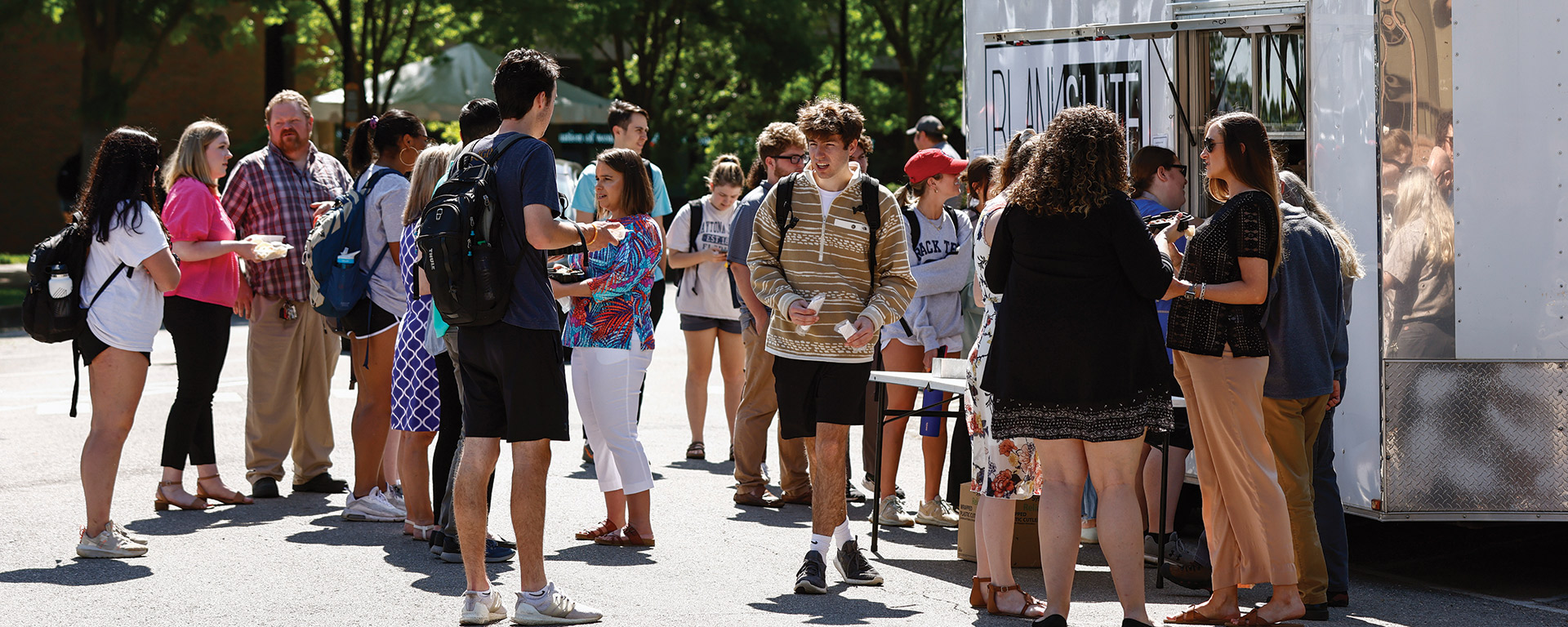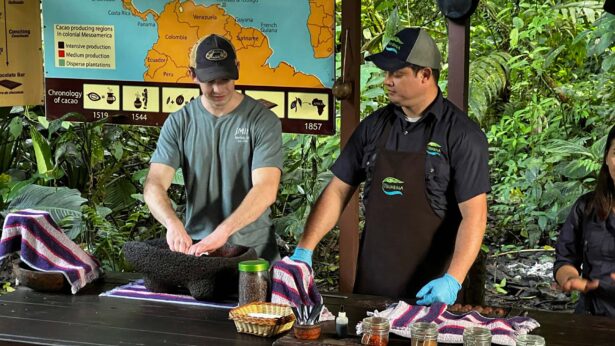“It’s here! It’s here!”
From her workspace inside the College of Nursing, Katie Perry has a prime view for spotting the bright white food truck rolling to a stop at the edge of Circle Park.
At just its second campus outing, the truck has already gained a following that eagerly awaits its return—those are the people who knew to arrive early before a line of nearly 40 people began stretching towards the edge of the College of Communication and Information.
But not everyone on campus has Perry’s advantage.
“See? It’s not that long,” one student exclaims as she steers her companion towards the site now blanketed by the savory aromas of grilling tortillas and melting cheese.
“You call that not long,” he responds, gesturing towards the line before joining it at the end.
One might think that the truck shuttles a celebrated chef or famed culinary creations, given the crowd it quickly attracted with its menu of mahi-mahi tacos, steak quesadillas, arroz con pollo and more. But the cooks inside are first-time food truckers. First timers—and undergraduate students. And the food they’re serving is free.
Today, the truck is their classroom.
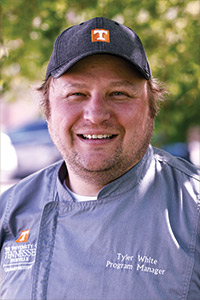
The seven students hurriedly preparing meals are enrolled in the Advanced Food Production and Service Management class through the Culinary Institute at UT Knoxville.
The food truck excursion caps the class’ semester-long experience in which the students learned the intricacies of the food-service industry—from planning menus and working cost control to deciding on the production and service methods and actually cooking the meals. Many of the lessons throughout the semester transferred into real-world situations, including the group planning a brunch event on behalf of UTK Chancellor Donde Plowman.
It’s one of three courses currently offered at the institute, including Science of Foods and Culinary Fundamentals as well as Principles and Science of Foodservice Baking.
Housed within the Department of Retail, Hospitality, and Tourism Management in the College of Education, Health and Human Sciences, the institute opened in 2005 as a program for Knoxville unemployed to gain workforce skills. Later, the institute collaborated with Pellissippi State Community College (PSCC) to allow PSCC students to work towards an associate of applied science degree with a major in business administration and a concentration in culinary arts.
But the courses weren’t available for credit to UT’s students until the spring of 2020, when the collaboration with PSCC ended. Program manager Tyler White—who, since 2011, had slowly taken over the institute’s operations—saw the opportunity to revamp the institute. That fall, he proposed a culinary minor.
Although UT students may now enroll in its classes, the Culinary Institute isn’t dishing out what you might think.
“Our niche is that we are not a chef school,” says White. “And it’s not necessarily chefs that we’re producing.”
Rather, the minor enhances the studies of nutrition; food science; and retail, hospitality and tourism management. For hospitality degrees, culinary knowledge makes for a more well-rounded managerial position; for nutrition, the minor equips students to give knowledgeable cooking demonstrations; for food science, students can better understand how their science translates within commercial-kitchen operations. Students in any major at UT may also take the institute’s courses as electives.
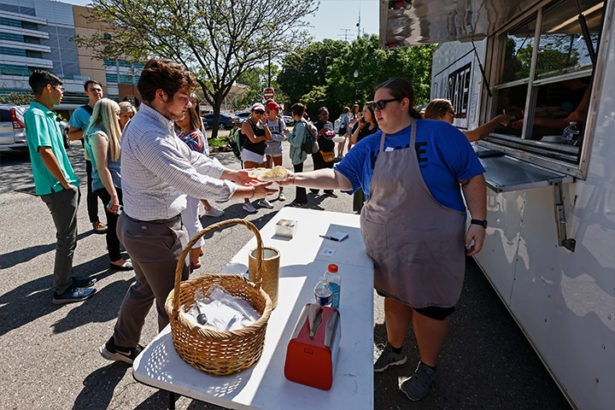
Inside the truck, the students—representing a range of majors—methodically scoop rice, beans and grilled chicken into to-go containers and spoon mahi mahi into warm tortillas before quickly passing them through the truck’s window.
“Who would think that a bunch of students are creating these meals,” says Caroline Williams, a junior majoring in hospitality and tourism management.
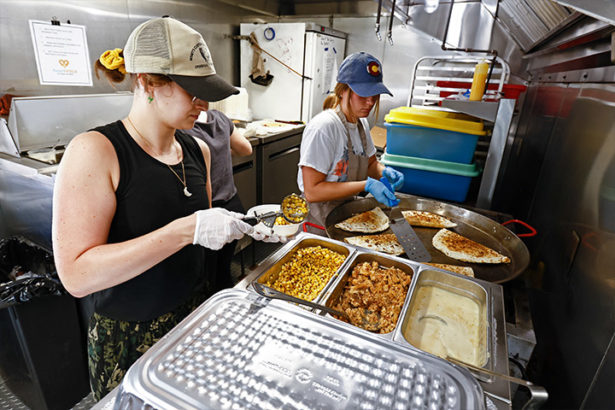
But, in under 90 minutes, the team of seven served 233 people from the window of the food truck.
White lingers on the outskirts so that his students can feel immersed in the experience, but he’s not oblivious to the full-circle moment he’s witnessing. Food4Vols, the institute’s food-reclaiming initiative that he founded in August 2021, powers the operation. Every meal passing through that window is made from recovered food—and it’s free.
“You kind of wonder what repurposed food means,” says Dan Click, who works in special events for UT, as he waits for his steak quesadilla. “But my coworker had it earlier and said it was delicious.”
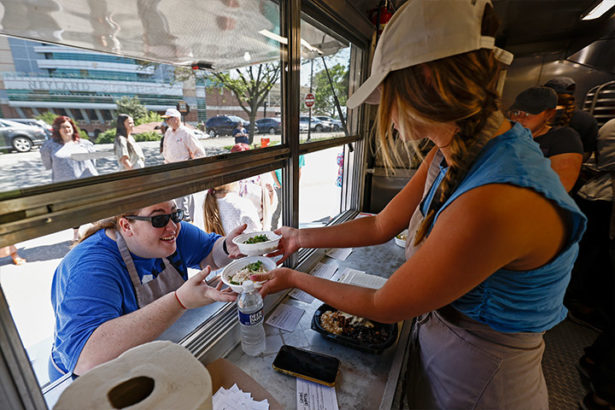
Every day, a truck from the institute goes out and collects the surplus—the unused, cooked and properly stored food from various food outlets across campus—before bringing it back to be repurposed, reimagined and redistributed into the community both on campus and off.
“We’re the hub for all recovered food on campus,” says White.
Most of their culinary re-creations go to Big Orange Pantry or to community entities such as Second Harvest. But White makes sure to include Food4Vols’ collections in his curriculum when possible. If the crowd gathered at the food truck is any indication, it’s a good blend.
“The price point is definitely just right,” jokes Robert Allen, owner of the truck and an instructor at the institute.
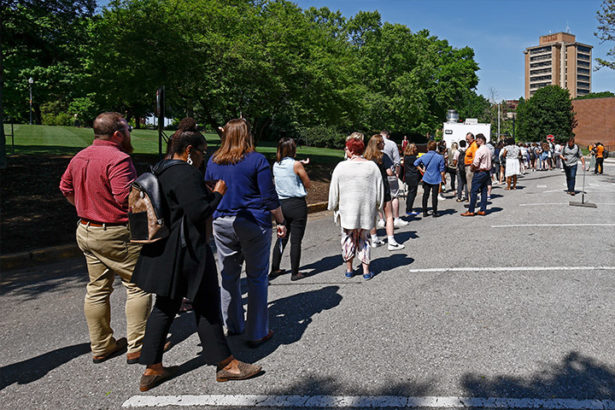
While the institute teaches culinary arts and tackles sustainability on campus, White feels that its importance is shown in the simplest of ways.
“It’s one of the most important programs on campus,” says White. “Are you going to deal with trigonometry for the rest of your life? Probably not.”
“But, for the rest of your life, you’re going to have to eat.” White’s students echo that sentiment.
“We center so much of our lives and social events around food,” says Makenna Brand, a senior studying nutrition with plans to become a dietician. “So, to be able to do this and learn the ins and outs has been really great.”
